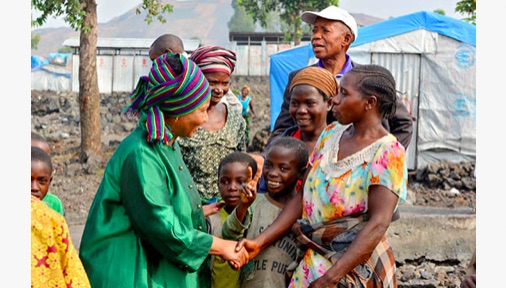. WOMEN’S EQUALITY .
Foreward to Annual Report by UN Women Executive Director Phumzile Mlambo-Ngcuka
In 2017 we saw an unprecedented upsurge of movements for women’s rights, equality, safety and justice. The tireless work of activists has been central to this global drive, and women all over the world continue to demonstrate the power of many voices speaking as one. Together, we are calling for opportunity and accountability, drawing momentum from grass-roots networks and forging coalitions that stretch right up to the leaders of governments, businesses and civic institutions.

UN Women Executive Director Phumzile Mlambo-Ngcuka visited a camp for people displaced by conflict in the Democratic Republic of the Congo. Despite the terrors of war and sexual violence, women leaders are forging ahead to make new, better lives for themselves and other women in the camp.
There is a profound hunger for change in women’s lives, and a growing recognition that when women band together they can achieve it—whether online through social media or offline through more traditional mobilization. They are confronting, challenging and condemning the practices that have normalized gender inequality, poverty, sexual miscon- duct, exclusion and discrimination across every area of life.
As our Annual Report shows, UN Women is supporting women politicians, electoral officials, voters, lawmakers, civil society activists and many others to claim their equal right to lead and be heard. The report highlights the experiences of a multitude of formidable women, from individuals like Alice Wahome, Kenyan parliamentarian, to the combined success story of the 14,000 Nepalese women who won an unprecedented 41 per cent of local government seats in 2017.
We salute these women leaders in formal positions as well as all those who have bravely spoken out against sexual harassment and violence through the #MeToo movement, and others. We commend the women who spoke out in the International Criminal Court against those who used rape as a weapon of war. We celebrate activists who campaigned for equal rights for lesbian, gay, bisexual, transgender and intersex people.
We recognize those who advocated for legal reform in countries such as Tunisia, to end a provision that allowed rapists to escape persecution if they married their victims. We acknowledge those who have taken to the streets in India to condemn the murder and rape of young children, turning protests into broader-based movements that engage entire communities. We honour the indigenous leaders who have stood up for their custodial rights to land and traditional practices, and the human rights defenders who have even lost their lives for their cause.
(continued in right column)
Does the UN advance equality for women?
(continued from left column)
Through our report we celebrate individuals we have supported, whose life experiences represent hundreds of thousands of others like them, and whose achievements are accelerating progress towards gender equality. Small business owner Olga Macz of Guatemala told us about the increased income, independence and mobility that came with learning professional production and marketing skills.
Training also brought her increased understanding and assertion of her rights. In Egypt, more than 17,000 women from the poorest and most marginalized rural areas now have their first access to community-based village savings and loan associations, building not just savings and busi- ness opportunities but confidence and increased autonomy.
The time is now to end all forms of gender inequality. The culture of gender-based poverty, abuse and exploitation has to end with a new generation of equality that lasts for all women and girls, no matter where they live, or how they live. We must leave no one behind.
UN Women has a special relationship with the women’s movement; we arose from that activism. Civil society has had a historically crucial role in leading global action on gender equality by promoting reform, highlighting the complexities of the challenges facing women, influencing policies, participating in monitoring, and upholding ac- countability. We are working to create stronger support for women’s political activism and a broader space for women’s civil society voices so that our efforts combine to benefit those who truly need change most.
At the same time, we also need a movement of male feminists, and young men and boys who value and respect women and girls. Today’s activism needs to alter the way we listen to women and the way we look at them, recog- nizing the power of stereotypes to influence how we value people. Activists and leaders in the HeForShe movementin 2017 found tangible and scaleable solutions for inequal- ities, like the 3,500 child marriages annulled in Malawi by local chiefs, or the practical accountability actions taken in Iceland to make sure that companies put the equal pay law into practice.
At the 2018 UN Commission on the Status of Women, youth captured the urgency of the moment. They highlighted the importance of being present and participating fully in all the issues that affect their lives. They emphasized working in an intergenerational context so that they can learn from those who have been around for much longer and contrib- ute to giving us direction for the future.
The time is now to hold ourselves and our leaders accountable for progress, for all women.